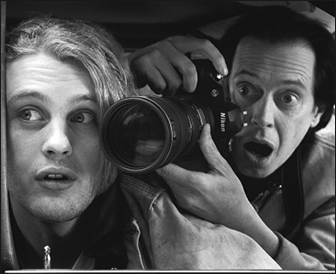By Steven Snyder
“Delirious” is really a story about parasites that hate their hosts — about men and women who leach off others, dependant on the very people they despise. At its center is Steve Buscemi in one of his very best roles as a celebrity photographer who detests the celebrities he stalks on a nightly basis. Yet his sense of purpose, his very identity, is defined by that velvet rope that he so obediently lines up behind, awaiting the arrival of that special someone who he will try to sneak a quick picture of.
Directed by Tom DiCillo, who has built a career around conflicted characters who twist and turn at the center of his independent films, Les (Buscemi) is among his most brilliant and disorienting creations. Crafted from real interviews DiCillo organized with celebrities and members of the paparazzi, what one sees in “Delirious” is a man with an identity crisis, caught somewhere between adoration and disregard, in a perpetual state of schizophrenia that becomes worse when he meets young Toby (Michael Pitt).
A homeless teenager who begs him for his help, Les takes this wide-eyed innocent under his wing — seemingly thrilled that anyone would look up to him, a mere photographer. But as Toby accompanies Les to industry parties, and is noticed by a casting agent, their relationship deteriorates. Suddenly Toby becomes a part of the establishment, earning a part in a soap opera that launches him forward as a bona fide celebrity. Shattered by this abandonment, Les tries to hold Toby back, but the tighter his grip becomes, the more Toby worms his way free, determined to break away from this bottom-feeder.
Meanwhile, always lingering in the distance is a performer by the name of K’Harma (Alison Lohman) — the isolated, insulated superstar that both Les and Toby long for. Both recognize something magical in the way she carries herself, only Toby senses in her something of a soul mate, while Les sees little more than an easy payday. Around and around, these three butt heads, most powerfully during a birthday party for K’Harma that Toby invites Les to. As he strolls the room, mere feet from the celebrities he has spent his life chasing, Les experiences something close to a mental breakdown, and as he starts to recognize these stars as people, something inside him snaps. His camera becomes his shield, and he reverts to the us vs. them mindset that has helped him survive so many years.
There’s something mythical, and mystical to the closing moments of “Delirious,” as both Toby and Les are forced to cope with the gulf that will forever separate them at different ends of the Hollywood spectrum. But then again, most of this movie takes on the properties of a fable. Celebrities are heralded as the gods of our modern popular culture, worshipped by fans who long to see stars fall from grace (the recent Paris Hilton and Lindsay Lohan breakdowns are only two immediate examples). “Delirious” is a movie fascinated by the rules of this relationship, and the way we mortals propagate this myth of the superstar. It has nothing to do with raw talent or plain luck, DiCillo seems to be saying; to the contrary, we all have a role to fill, and a way in which we’re expected to fill it.



































